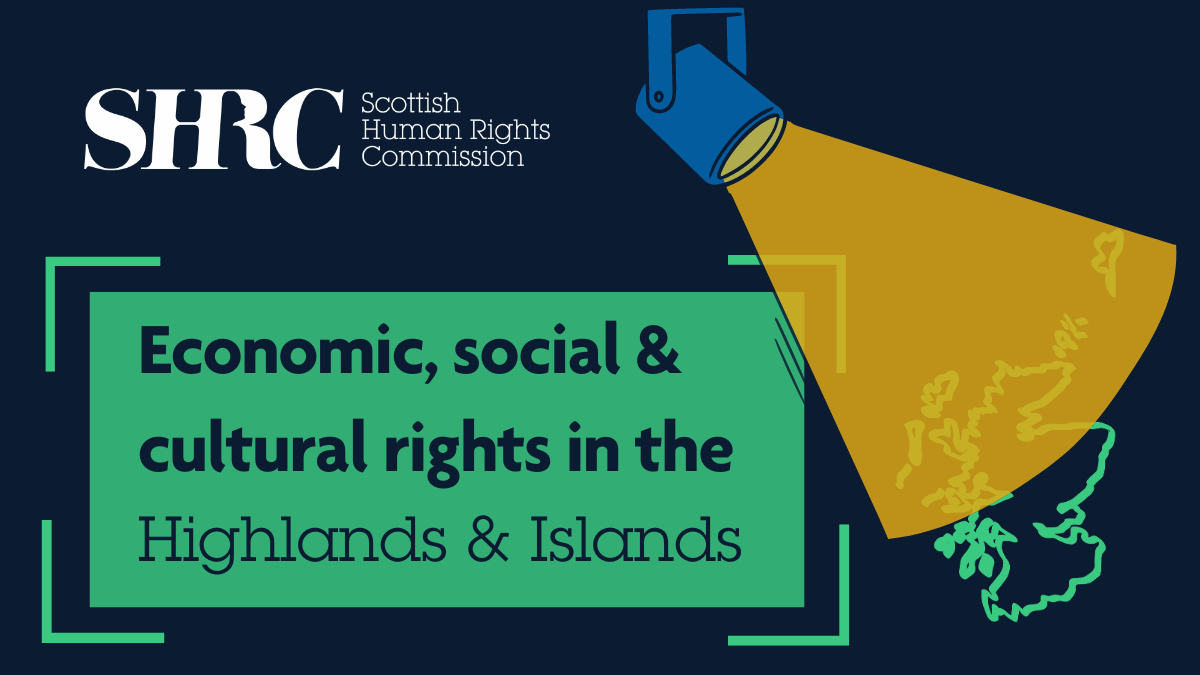Why we are spotlighting this issue
In the last few years, the Commission has become increasingly concerned about economic, social and cultural (ESC) rights in the Highlands and Islands. ESC rights are necessary to live a life free from fear and want, examples include:
We have been particularly concerned about the lack of available data for monitoring in the Highlands and Islands, when compared with the rest of Scotland. By listening to the lived experiences of residents and organisations in the area, as well as through our human rights treaty monitoring work, we identified specific issues affecting rural and island communities, such as:
- Slow and inaccessible health care services
- Lack of affordable housing
- Limited access to sufficient and nutritious food
- Poverty related gaps in education
- Limited access to technology and poor internet connectivity
- Fuel poverty
What the project aimed to do
This project is a step toward filling the gaps in human rights data and making sure that rural and island communities have their economic, social, and cultural rights met.
We aimed to bear witness to the lived experiences of people and communities across the Highlands and Islands, to raise awareness of human rights issues in these areas with decision-makers and to highlight the need for a geographically-specific approach to Scottish law and policy.
This project also piloted our new human rights monitoring model which brings us closer to local communities and their human rights concerns. See the section on what is next for more on this.
What we did
Fact-finding visit
An essential part of this project was for the Commission to go to the Highlands and Islands and to hear first-hand from human rights defenders on the ground about the issues facing their communities.
In late 2023, Project Lead Dr Luis F Yanes and various members of the Commission team undertook a six week fact-finding trip to the Highlands and Islands, visiting more than twenty towns across six local authorities and meeting with 146 people, including:
- human rights defenders
- community representatives
- MSPs and their caseworkers
- third sector staff
- advice givers
- representatives of community development trusts
- teachers
- crofters
- lawyers
- health workers
- housing professionals
We were approached by a huge number of charities and community groups who were concerned about economic, social and cultural rights in their areas.
We are very grateful to everyone who met with us during the trip. We gained valuable insight into the challenges facing rural and island communities which affect their economic, social and cultural rights.
Report
In November 2024, we published a comprehensive report which looks at the realisation of all economic, social and cultural rights in the Highlands and Islands.
The report used the information we gathered during those visits - as well as desk-based research and analysis of human rights complaints to MSPs and the Scottish Public Services Ombudsman - to create a new evidence base for understanding human rights in the region.
Some of the most critical issues that we found are the apparent failures to meet the most basic international obligations related to the right to food, the right to housing, the right to health, and the right to cultural life.
Across all rights examined, there is not a single human right that meets all the conditions of adequacy under international law. This means that there are significant failures in how policies and services are being designed and/or delivered and services across the Highlands and Islands are not fully accessible, affordable, available, acceptable, or of sufficient quality (among other conditions).
Have 5 minutes?
Read our Executive Summary - available as a PDF and an accessible Word document - below. Or watch the report in BSL on our YouTube channel or on the BSL page of our website.
Have more time?
Read the full report below. Available as a PDF and an accessible Word document.

Publications
What is next
Ultimately, we hope this report contributes to the improvement of economic, social, and cultural rights in the Highlands and Islands, ensuring that no one in Scotland is left behind.
Returning to the Highlands and Islands
A critical next step for us was to bring the lessons learned from this project back to the communities affected. Between February and March 2025, we travelled back to the Highlands and Islands to share the findings of this report and hold sessions on ESC rights framework designed to empower human rights defenders. We also met duty-bearers and provided technical advice and support on how to ensure they can take a human rights based approach to their policies and service delivery.
Holding duty bearers accountable
As Scotland's National Human Rights Institution, we aim to hold duty-bearers accountable. Our report makes eight recommendations for actions that duty-bearers can take to ensure full compliance with Scotland’s international human rights obligations.
We have now shared our report with the Equality, Human Rights and Civil Justice Committee, and encouraged the Scottish Parliament to ensure that the Scottish Government, local authorities, and other duty-bearers take appropriate action.
In January 2025, the Scottish Parliament held a Members Debate put forward by Rhoda Grant, MSP for the Highlands and Islands to discuss the findings of our report. In a response to a subsequent written question from Rhoda Grant, the Scottish Government committed to issue a response to the report before the Scottish Parliament's summer recess. We look forward to seeing their next steps for addressing the issues we raised. Watch the debate below:
Long-term, this project is the beginning of a new type of monitoring for the Commission. We intend to use this model over the next three years to build a baseline picture of economic, social and cultural rights realisation across Scotland in other regions of Scotland, starting with the South of Scotland in 2025. Our aim is to expand our approach to monitor all areas of the country every year, ensuring we are able to track progress or deterioration of rights.
















